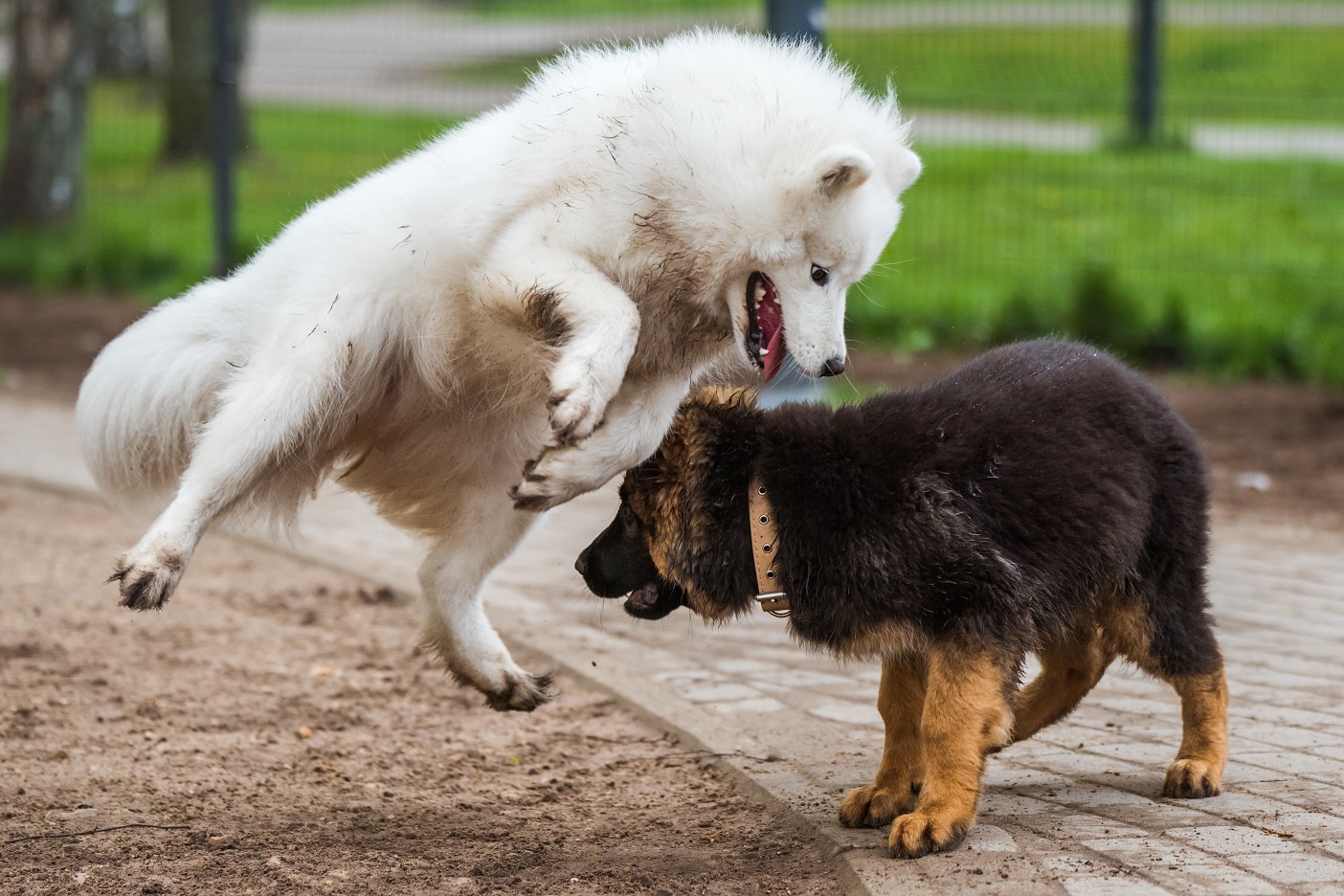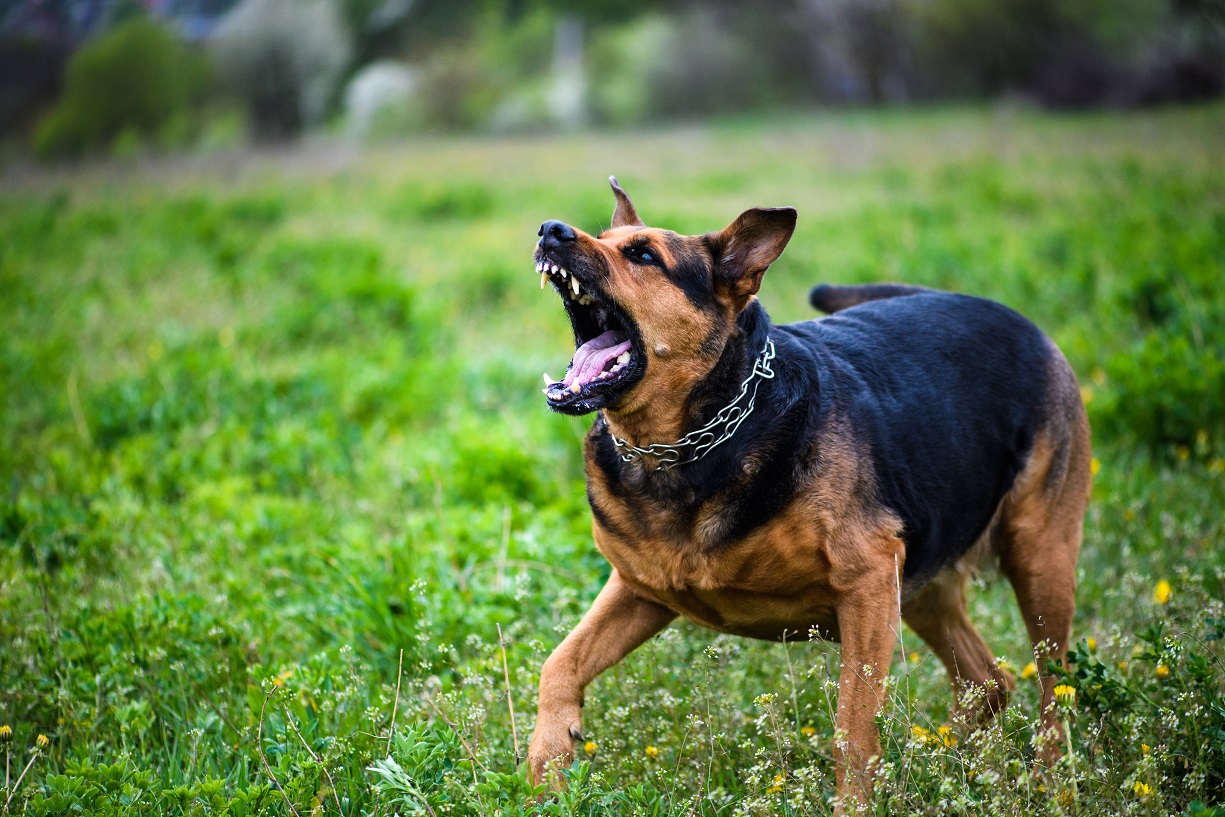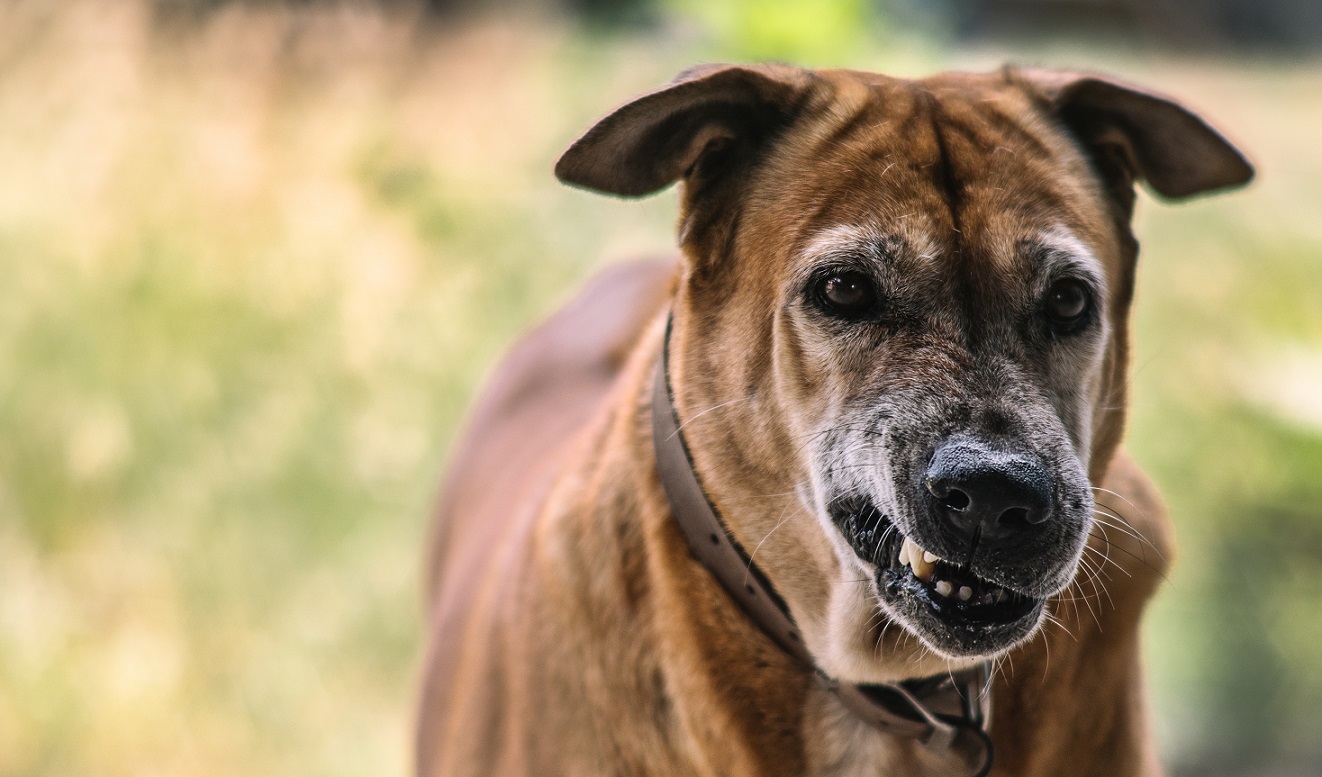“Why is my dog more aggressive after being neutered?” It’s a question I bet you never thought you’d have to ask.
Because neutering calms a dog down, right?
Hormones are what turn angelic pups into fighting machines. Neutering stops those hormones in their tracks. So neutering should automatically end the aggression, surely?
Yes. Except when it doesn’t.
Don’t get me wrong. Neutering can and does stop many types of aggression in a lot of dogs. But it doesn’t guarantee it. And that’s the crux.
The only thing neutering is 100% guaranteed to do is stop any unwanted pregnancies. That in itself is sufficient reason to neuter your dog.
The problem is, most of us expect more from the neutering process than we’ve got a right to.
There’s a common assumption that neutering will magically ‘fix’ problem behavior. And in some cases, it does.
For instance, if your dog is a humping machine that can’t get within sight of a female in heat without puffing out his chest and ripping shreds out of the competition, neutering will usually help.
Why?
Because the behavior is being driven by surging hormones. And if there’s one thing that neutering deals with in no uncertain terms, it’s surging hormones.
The problem is, not all aggression is the result of too much testosterone.
Fear, territorialism, poor socialization, a lack of exercise…. all of these things can cause aggression. And none of them are going to disappear when the testosterone does.
Even certain hormonally driven behaviors might stick around. Dogs are more than just a bunch of hormones, after all. They’re sentient beings capable of learning and developing certain habits… habits that neutering isn’t always enough to break them off.
The final kick in the teeth? …neutering can sometimes make certain types of aggression worse. Because if there’s one thing testosterone does (apart from the obvious), it’s to make a dog confident.
Take it away, and the dog can suddenly become a lot more anxious and shy than they used to be. As fear is one of the most common underlying causes of aggression, neutering might simply heap more trouble on your plate than ever before.
Ultimately, neutering only guarantees your dog won’t be making any pups any time soon. It doesn’t guarantee a more chilled out canine.
If you want to tackle aggression, you can’t just leave it to the scalpel. You’ll need to get to the root cause and tackle it directly.
The first step? Teach your dog how to take control of their emotions.
There are various methods you can use but if you want to see how the experts do it, check out the Dog Calming Code from the Online Dog Trainer, Dan Abeldnoor. (see video below)
Dan’s put the exercises together specifically to help dogs who struggle to keep their emotions in check.
So if you want to install some calm into your dog’s life (not to mention your own), the training is going to be invaluable.
Here’s the link to take a look: Click Here To Discover How To Finally Stop Your Dogs Dangerous, Scary Aggression Problem.. Even If You’ve Tried & Failed Before!
(video will open in new window)
Why Do Dogs Get Aggressive?
Dealing with an aggressive dog isn’t just a nuisance. It can be frightening.
If you don’t know what’s causing the aggression, it can be even more so.
And while there’s a multitude of reasons for aggression, some of the most common explanations include:
Fear
Believe it or not, fear is one of the primary causes of aggression. As to what could make a dog fearful… well, take your pick.
Maybe they weren’t socialized when they were young and now find new experiences scary.
Perhaps they’ve suffered some kind of trauma or abuse in their past.
It could be that another dog attacked them on a walk.
Regardless of what’s driving the fear, the response is typically the same. Your dog feels threatened and under attack.
If there’s a way to escape, they’ll probably take it. If there’s not, they’ll bark, lunge, and even bite until the scary thing backs off.
Frustration
No matter how old a dog gets, they never lose their inner child. Sometimes, it’s adorable. At other times… not so much.
Tell a toddler they can’t have what they want, and you’re looking at a temper tantrum waiting to happen. Tell a dog the same thing, and it’s only a matter of time before they start throwing their toys out of the pram.
Maybe they’ve seen the neighborhood cat prowling along the top of a wall. Maybe there’s a group of dogs on the other side of the fence they want to say hello to.
Whatever it is, if they want it but can’t get to it, they’re going to get frustrated and snappy with anyone who makes the mistake of approaching.
Anxiety
People like to think they’ve got a monopoly on anxiety. But the truth is, dogs are just as likely to experience it as we are.
If something’s changed in their environment (maybe you’ve moved or welcomed a new pet or baby to the family), they might be feeling nervous, uncomfortable, and prone to lashing out in stress.
Territorialism
Some dogs don’t give a hoot about a newcomer invading their patch. Others really don’t like it.
If another dog or person ventures into their territory, they’ll do what they have to to protect it. And if that means the mailman lives in permanent fear of his life, then so be it.
Resource Guarding
Toys, food, even people… all of these things have high value to a dog. While some pooches are happy enough to shares their treasures, others really aren’t.
If someone gets in the way of something they value or, even worse, threaten to take it away from them, the fangs will very quickly come out.
Social Aggression
Lest we forget, dogs are pack animals. Establishing a social hierarchy is part and parcel of living together as a group.
Most of the time, it doesn’t create any problems. Dogs will quickly establish exactly where they are in the pecking order in relation to other family pets and members, and be happy enough to stay there.
But every now and again, things go wrong. Most of the time, the poop hits the fan when you have two dogs of similar social status. Until they decide on which of them is top dog, tensions will continue to erupt.
Related Post: How To Socialize An Aggressive Dog – A Step By Step Guide

Why is My Dog More Aggressive After Being Neutered?
Neutering has a problem. A problem that isn’t so much to do with the process. But to do with our expectations of it.
Neutering isn’t simply seen as a means of controlling the canine population. Nor is it simply seen as a way of mitigating the risk of certain cancers and diseases.
It’s seen as a magic bullet, a magic bullet that is going to miraculously ‘fix’ your dog’s behavior and make up for 101 training and socialization failings.
Newsflash – it isn’t.
Most studies suggest that certain types of hormonally aggravated behaviors will be reduced after neutering.
So, if your dog humps everything they can get a leg around…
…if they like to mark out their territory,.
…and if they’ll run for miles at the whiff of a female, there’s a good chance you’ll see some improvement after surgery.
But if they’re aggressive because they haven’t been trained or socialized adequately. If they lash out in fear, if they’re territorial, or if they really don’t like it when people touch their stuff. Neutering isn’t going to do a thing.
In fact, it might even make the problem worse.
Testosterone gets a lot of bad press, and sometimes, rightly so. But the one thing testosterone is very, very good at is making a dog more confident.
Cut the supply of testosterone (which neutering does), and suddenly, you’re dealing with a far nervier dog than you were before. And that’s a problem. Because as we’ve already seen, fear is one of the primary causes of aggression.
Whereas your dog may have taken other dogs, people, and experiences in its stride before, it might not be quite so inclined to do the same now.
Loud noises, unfamiliar children, strange objects, a barking dog…. when a dog is neutered, all of these things can suddenly become a lot scarier than they were before.
And how does a dog react when it’s scared? Yep, with aggression.
Even if your pooch doesn’t become a scardy cat overnight, there’s still no guarantee that their behavior is going to see a change for the better.
Dogs aren’t just bags of hormones. Genetics, temperament, training, and upbringing can all have a major impact on a dog’s behavior.
Is neutering going to override those things and change your dog’s personality with the cut of a knife? …Not a chance.
Relying on neutering to change a raging bull into a placid pooch is a fool’s errand. If you want to improve your dog’s behavior and put an end to their aggressive tendencies, you’ll need to find the reason for the aggression and address it with the corresponding training technique.
Related Post: How To Calm An Aggressive Dog – Simple Tips For Aggressive Behavior

How to Stop Your Dog From Being Aggressive
So, we know neutering isn’t going to magically make your dog’s aggression disappear. But what will?
Ultimately, nothing.
There’s no magical cure, no quick fix. Aggression is a serious problem that demands a serious approach.
Getting to the root of your dog’s behavior and implementing positive changes will take time, dedication, and consistency.
But persevere. Very few problems can’t be tackled. With the right approach, you should notice a dramatic difference in your dog’s behavior.
Here’s what you need to know…
Identify the Problem
We all want a quick fix. We all want to jump to the solution as quickly as possible. The problem is, it doesn’t work.
If your dog’s aggression has become worse since they were neutered, then it’s crucial to work out why. Take a step back and consider the circumstances around your dog’s behavior.
- Are they only aggressive around certain people or in certain situations?
- Do they get angry whenever someone approaches them when they’re eating?
- Do they exhibit nervous behaviors around other dogs?
At the same time, consider their background.
- Were they socialized as a puppy?
- How have they been trained?
- Are they a rescue dog with a history of neglect or abuse?
Take stock of everything and anything that could be causing your dog’s behavior.
Once you’ve managed to identify the cause, you’ll have a much easier time building a targeted, tailored plan of action.
Get Them Checked Out
If your dog’s aggression has suddenly taken a turn for the worse, book a visit to the vet.
Certain medical issues can result in dramatic behavioral changes, especially if they’re accompanied by symptoms such as a loss in sensory perception or cognition.
Be sure to let your vet know if you’ve noticed any other changes such as a loss of appetite, lethargy, or a change in sleeping patterns.
Avoid their Triggers
Once you’ve identified what’s causing your dog’s behavior, try to reduce exposing them to their triggers as much as possible.
Over time, you can work on addressing their behavior through behavior modification techniques. While that’s in process, it’s vital to avoid putting yourself or your dog in a potentially dangerous situation.
If they display fear-based aggression around other dogs, time your walks when it’s quietest. If they get angsty around strangers coming into the home, try to limit visits.
Keep their environment as calm, controlled, and safe as possible. And supplement your efforts by working the training from The Dog Calming Code into their routine.
Remember… the more controlled and calm your dog is, the less risk of an incident.
Behavioral Modification Techniques
A combination of counter-conditioning and desensitization techniques can help address the root cause of aggression.
Counterconditioning works by replacing negative associations with positive ones.
Say your dog finds seeing other dogs on a walk triggering because of a poor experience in the past. Each time they pass another dog, treat them to a high-value reward.
Over time, your dog will learn to associate other dogs with something good happening and stop seeing them as a threat.
Desensitization is the process of getting your dog used to certain stimuli by very gradually increasing their exposure to it.
Going back to the previous example, start by taking your dog to an area where they can see another dog, but it’s far enough away not to trigger a reaction.
Using a combination of rewards and praise, you can gradually work on reducing the distance between them.
The process can be slow, as it’s vital to work at your dog’s pace. But with time and patience, you should notice a marked improvement.
Keep Calm
Regardless of the cause of the problem and regardless of the solution. One thing that’s guaranteed to make a substantial difference to your dog’s behavior is teaching them how to stay calm and in control.
If you haven’t already, check out The Dog Calming Code.
It’s been specifically designed to teach even the most over-excitable, anxious dog how to master their emotions. Something that’ll not only reduce the chance of an aggressive incident, but that’ll make training a far easier task for both you and them.

Final Thoughts
Dealing with canine aggression is never easy. It’s especially challenging if you’d pinned all your hopes on neutering solving the problem, only to find it worse than ever before.
But that doesn’t mean the situation is irreparable. Neutering may not have addressed the problem, but that doesn’t mean you’re stuck with it.
Identify the cause, decide on the best solution, and then practice, practice, practice.
Your dog’s aggression isn’t going to disappear overnight, regardless of how tightly you keep your fingers crossed.
But with time, patience, and plenty of perseverance, you’ll soon start to see the light at the end of the tunnel.

